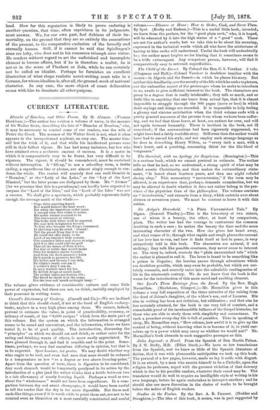CURRENT LITERATURE.
Blanche of Bourbon, and Other Poems. By H. Alcmar. (Thomas Hookham.)—The author has written a volume of verse, in the manner of Sir Walter Scott, describing the fate of " Blanche of Bourbon," who, it may be necessary to remind some of our readers, was the wife of Pedro the Cruel. The manner of Sir Walter Scott is not, what it often appears to the inexperienced aspirant, an easy one. The master him- self lost the trick of it, and that while his intellectual powers wore still in their fullest 'vigour. He has had many imitators, but few who have attained even a moderate amount of success. It is a metre in which it is comparatively easy to be fluent, but very difficult to be vigorous. The vigour, it should be remembered, must be sustained without interruption. A "fill-up," to use a schoolboy term, a feeble ending, a superfluous line or phrase, are almost singly enough to con- demn the whole. The reader will scarcely find one such blemish in " Marmion," or the "Lady of the Lake," or the "Lay of the Last Minstrel," but the later poems are disfigured by them. Mr. " Alcmar (for we presume that this is a pseudonym) can hardly have expected to surpass the "Lord of the Isles," and the "Lord of the Isles" was not a success. We shall give a specimen, which probably represents fairly enough the average merit of the whole :— " Mtge Ortiz startling beard,
Nor would believe the fatal word; But when the imperious order came A second time that crime to name, His noble nature scorned to be The instrument of villainy.
The bribe with bitter scoff be spurned, His soul with indignation burned. To him who brought the King's command, In thrilling tone he cried. • Attend Tell the proud King that if to me He could the offer make, to be Lord of an empire's wide domain, O'er countless tribes and slaves to reign; And if to this could add the gold
That all the mines of Peru bold—
Not that or treble that would make Ortiz his helpless Queen forsake, And from the dark assassin's knife He'll perish to preserve her life.
His bribes and threats I can defy, No villain's ready tool am I; A soldier's duty I can do, In open warfare meet my foe.
By hellish drugs or secret knife The soldier takes not human life; The blood he sheds is in the camp, Not the lone cell 'neath midnight lamp.' "
The volume gives evidence of considerable culture and some little power of expression, but these are not, we think, usefully employed by their possessor in writing verse.


































 Previous page
Previous page